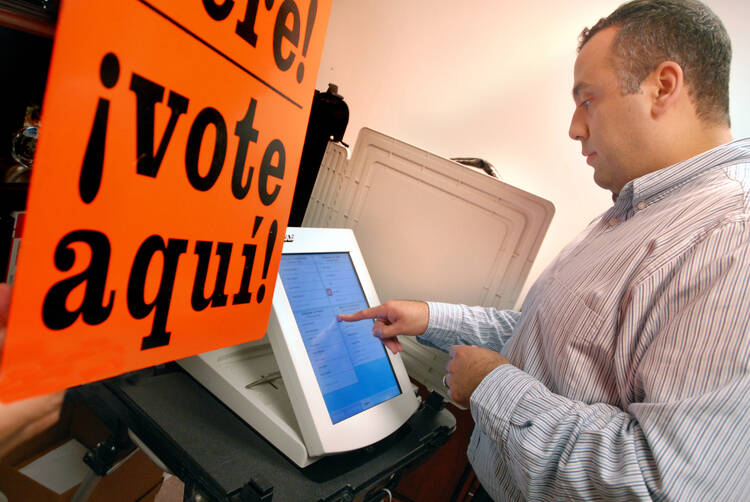Voting on Trial
It is not yet November, but voting in this year’s midterm elections is well underway. In North Carolina, Alaska and Georgia, election officials have already sent out “no excuse” absentee ballots. And thanks to a recent federal court ruling that blocked early voting restrictions in the Buckeye State, Ohioans can begin voting in person on Sept. 30.
Ohio, an important, vote-rich swing state, expanded early voting in 2008 after long lines kept people waiting at polling sites for over five hours in 2004. But earlier this year the Republican-controlled General Assembly eliminated the first six days of early voting—the “Golden Week,” during which African-American churches often run registration and voting drives—and the secretary of state reduced weekend and evening voting hours. In a suit filed by the American Civil Liberties Union on behalf of the Ohio branch of the N.A.A.C.P. and the Ohio League of Women Voters, Judge Peter C. Economus ruled that the measures violated the 14th Amendment and the Voting Rights Act by eliminating voting periods favored by African-Americans.
It is important to make voting more accessible to members of minorities and low-income citizens who may have trouble taking off time to vote during working hours. It is a sad commentary on the state of U.S. politics when something as fundamental to the democratic process as casting a vote is made a partisan issue. Over the past three decades early voting has been expanded in the name of voter convenience with little controversy. Today, in Ohio and other states where similar issues are being fought over in the courts, legislators need to reach across the aisle to establish early voting regulations, encourage maximum participation and restore confidence in the election process.
Belaboring Child Labor
Toxic working conditions, no living wage, 12-hour workdays—a sweatshop circa 1900? In fact, it is the economic reality of 2014, not just for adults, but for children, and not just in the developing world, but right here in the United States.
A recent report about a 13-year-old girl working in North Carolina tobacco fields—under conditions even an adult should not endure—is shocking. More shocking is that it is perfectly legal for her to do so. Today young immigrants and children of migrants often perform jobs no one else will do in order to help their families survive in difficult economic times. In 2011 the Obama administration sought to ban work in tobacco fields for those under 16, but was thwarted by Republican lawmakers and farm groups. Though some tobacco companies restrict the use of child labor, their growers, contractors and workers find ways to get around labor and safety regulations.
The United States is not the only country where child labor is an issue. One in 10 Syrian refugee children in Turkey have to work to support their families. And while a U.N. convention sets 14 as the minimum age for work, in July Bolivia became the first nation to pass a law permitting 10-year-olds to work.
The global economy is becoming increasingly complex, but one thing is clear: parents should make a living wage, so their children will not have to work for a minimum one. Children should not be exploited as economic tools for someone else’s profit.
Protecting Human Dignity
At the end of August, the California Legislature unanimously approved a bill that its crafters hope will set a precedent for combatting sexual assault on campus.As summarized by The San Jose Mercury News (8/28), Senate Bill 967—nicknamed the “Yes Means Yes” bill—”would require all colleges taking student financial aid funding from the state to agree that in investigations of campus sexual assaults, silence or lack of resistance does not imply a green light for sex, and that drunkenness is not an acceptable defense.” It also calls for outreach programs to help victims with counseling, legal advice and other services. Bill 967 currently awaits a signature from Gov. Jerry Brown.
While many have praised this proactive approach, others have criticized the bill’s convoluted rhetoric and see it as overly invasive. An editorial in The Los Angeles Times describes the bill as “intrusive” and merely a way to “micromanage sex so closely as to tell young people what steps they must take in the privacy of their own dorm rooms.”
Prevention of sexual assaults must begin long before students arrive on campus. In “Talk About Steubenville” (4/8/13), America’s editors wrote that rape prevention starts when parents talk to their children about sex, especially to young boys about “the sort of behavior expected of them in protecting the human dignity of the people they will encounter later in life.” Middle schools and high schools can reinforce these sensitive private discussions with programs that teach young people how to prevent and report sexual assault and discourage behaviors, like blaming the victim, that add to the crisis. By having these difficult but necessary conversations, parents and schools can equip students to fight the scourge of rape on campus.








